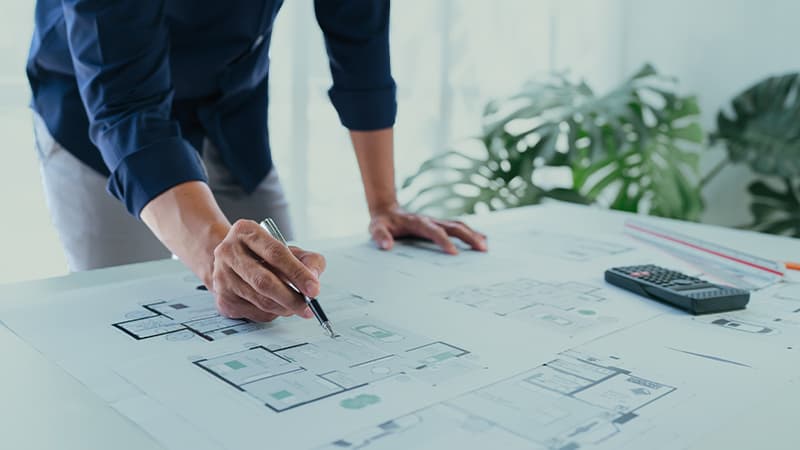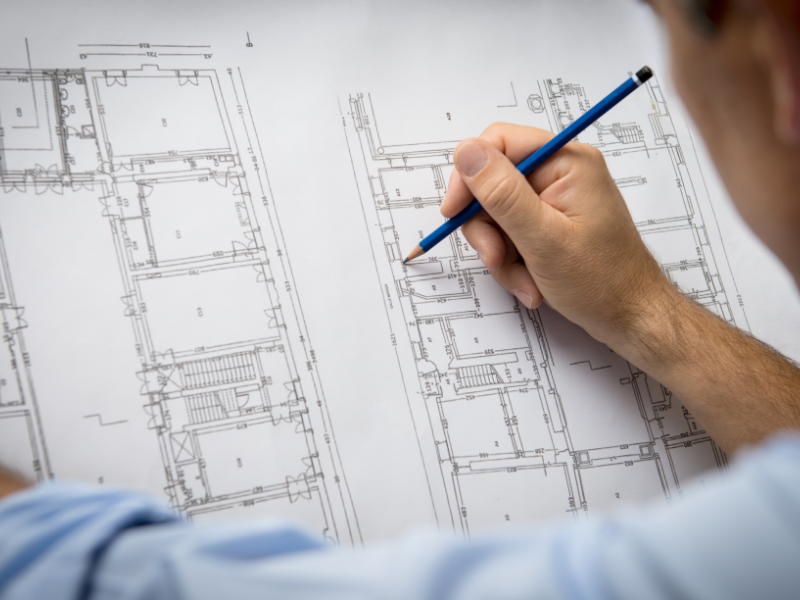Architect Guide to Eco-Friendly Building Materials
Architect Guide to Eco-Friendly Building Materials
Blog Article
Discover the Essential Skills and Top Qualities Every Architect Have To Have
As a designer, you recognize that success in your field surpasses simply technical skills. It has to do with mixing imagination with practicality, fostering collaboration, and handling jobs efficiently. Each high quality plays a crucial role in your ability to design spaces that influence and function well. What are the specific abilities that can really establish you apart? Let's explore the important features every Architect must cultivate to flourish in this ever-evolving occupation.
Creativity and Innovation
Creative thinking and technology are at the heart of architecture, driving the layout of spaces that motivate and function effortlessly. You'll constantly discover new materials, strategies, and technologies to enhance your designs.
You'll likewise draw inspiration from different resources-- nature, art, and also everyday life can stimulate fresh concepts. This capability to blend creative thinking with usefulness permits you to attend to complex problems, ensuring your styles fulfill both aesthetic and functional requirements.
Strong Interaction Abilities
While developing impressive spaces needs imagination, solid communication skills are just as important for architects. You need to convey your concepts clearly to clients, service providers, and staff member. Paying attention is equally as crucial; recognizing your customer's vision helps you create designs that truly meet their requirements.
You'll often have to discuss intricate concepts in such a way that's easy to grasp, whether you're offering a proposition or reviewing products. Effective interaction cultivates partnership, making sure everyone is on the very same web page throughout the task.
Structure partnerships is important, too. When you develop trust fund and connection, clients are more probable to share their problems and responses, causing better end results.
Last but not least, don't undervalue the power of body language and aesthetic help. They can enhance your message and make your presentations extra appealing. Strong interaction skills not just boost your designs but likewise enhance your expert partnerships in the architectural globe.
Technical Proficiency in Layout Software Program
As you browse the ever-evolving world of design, understanding style software ends up being necessary for translating your creative concepts right into tangible strategies. Familiarizing yourself with programs like AutoCAD, Revit, and SketchUp will certainly not only boost your design abilities however additionally streamline your process. These devices enable you to develop detailed drawings, 3D designs, and also simulations that can help you picture and offer your principles extra efficiently.
Being skillful in these software applications likewise improves your cooperation with professionals and engineers, as everybody can function from the exact same electronic foundation. Additionally, your ability to adapt to brand-new technologies will keep you competitive in the area. Routinely upgrading your abilities and exploring new attributes can set you apart from your peers, guaranteeing your styles are precise and cutting-edge. Eventually, technical proficiency in style software program is a foundation of effective style, aiding you bring your visions to life.
Comprehending of Engineering Concepts

Understanding engineering concepts likewise allows you to prepare for possible difficulties early in the layout procedure. When you're mindful of just how different materials behave under different conditions, you can make educated choices that enhance your layouts. Your designs must not just be aesthetically pleasing but lasting and likewise sensible.
Additionally, a solid grasp of design principles permits you to introduce within restrictions. You can press innovative borders while still sticking to security criteria. Eventually, this understanding enriches your architectural technique and sets you apart in a competitive field.
Job Administration Talents
Reliable job management capabilities are important for engineers, enabling you to manage all aspects of a project from perception to completion. You'll require to collaborate with different stakeholders, consisting of service providers, engineers, and clients, guaranteeing every see this here person's on the exact same page. Setting clear objectives, timelines, and budgets is fundamental; it assists you maintain the job on the right track and within extent.
As an architect, you should additionally be skilled in jeopardy monitoring, determining prospective problems before they escalate. Strong communication skills are necessary, allowing you to articulate your vision and inspire your team. You'll profit from being organized and detail-oriented, as this assists enhance procedures and stay clear of expensive hold-ups.
Furthermore, versatility is vital; tasks typically develop, and being versatile enables you to react successfully to changes. Ultimately, your task monitoring skills can greatly affect the success of your architectural endeavors, ensuring you provide top quality results on schedule and within budget plan.
Focus to Information
While taking care of projects is essential, your interest to information can make a considerable difference in the high quality of your work. Every line you draw, every product you select, and every little requirements you keep in mind contributes to the general success of a project. You need to be thorough, ensuring that your styles not just satisfy visual criteria yet also follow building policies and codes.
Missing also a little information can result in costly alterations or security concerns down the line. By cultivating a keen eye for detail, you improve your ability to identify potential issues before they rise. This alertness not only saves you time and resources but also constructs your online reputation as a dependable Architect. Keep in mind, it's frequently the tiniest details that raise a task from good to outstanding. Welcome this skill, and allow it direct your design procedure, making sure that your vision is carried out faultlessly.
Adaptability and Problem-Solving Abilities
As an architect, you'll typically deal with unexpected adjustments in layout and project demands. Your ability to accept these changes and discover ingenious options is vital for success. Staying versatile in your method not only boosts your problem-solving skills however additionally keeps your tasks on course.
Embracing Change in Layout
Welcoming change in layout is crucial for engineers, specifically when guiding developing client requirements and emerging innovations. You require to cultivate flexibility, as jobs often shift instructions based upon new insights or constraints. Being open to change enables you check my site to check out innovative methods and produce services that resonate with your customers.
When faced with obstacles, your analytical skills come into play. You'll typically need to rethink principles and adjust intend on the fly, ensuring that the last outcome straightens with the client's vision while satisfying safety and regulative standards. By being adaptable and resourceful, you not just improve your designs but also construct trust fund with your clients, proving that you can navigate the complexities of modern architecture effectively.
Innovative Solutions to Obstacles

Adaptability in Project Administration
While steering the intricacies of job administration, adaptability comes to be a vital possession for designers. You'll commonly encounter unexpected challenges, from style adjustments to spending plan constraints, calling for fast thinking and flexibility. Accepting change enables you to pivot your techniques and find innovative solutions, making certain task success.
Strong problem-solving abilities are crucial; they allow you to assess situations, consider options, and implement reliable remedies on the fly. When working with diverse groups, being open to comments and alternate ideas cultivates cooperation and triggers imagination.
Regularly Asked Concerns
What Educational History Is Required to Come To Be a Designer?
To become an architect, you'll need at least an expert level in design, frequently a Bachelor's or Master's. Completing an internship and acquiring licensure with exams is crucial for your career improvement.
Just How Vital Is Networking in the Style Field?
Networking's essential in architecture. It helps you construct partnerships, uncover work opportunities, and gain insights from experienced professionals. By getting in touch with others, you enhance your job leads and remain updated on sector patterns and growths.
What Are the Common Career Paths for Architects?
Typical job paths for designers consist of design duties in companies, job management, metropolitan preparation, and specialized locations like lasting architecture. Architect. You might additionally discover mentor or consulting, depending upon your passions and experiences
How Can Designers Remain Updated With Market Trends?
To remain updated with sector patterns, you must regularly go to meetings, sign up with specialist associations, subscribe to pertinent publications, and engage with online discussion forums. Networking with peers also assists you obtain insights right into arising growths More hints in design.
What Duty Does Sustainability Play in Modern Architecture?
Sustainability shapes contemporary design by highlighting energy efficiency, source conservation, and environmentally friendly products. You'll develop spaces that reduce environmental impact, enhance owner health, and react to climate challenges, making your layouts much more impactful and appropriate.
While making impressive rooms needs imagination, strong communication skills are just as crucial for engineers. Strong communication abilities not just elevate your designs however additionally strengthen your expert partnerships in the architectural world.
Efficiency in design software application lays the groundwork for a deeper understanding of design principles, which is necessary for engineers.As a designer, you'll commonly encounter unanticipated adjustments in design and task needs.Welcoming modification in layout is vital for architects, particularly when steering developing client needs and arising modern technologies.
Report this page